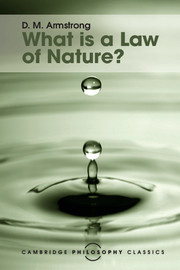Book contents
- Frontmatter
- Dedication
- Contents
- Preface to this edition
- Acknowledgements
- Part I A critique of the Regularity theory
- 1 Introductory
- 2 Critique of the Regularity theory (1): The problem of accidental uniformities
- 3 Critique of the Regularity theory (2)
- 4 Critique of the Regularity theory (3)
- 5 Can the Regularity theory be sophisticated?
- Part II Laws of nature as relations between universals
- Conclusions
- Works cited
- Index
3 - Critique of the Regularity theory (2)
from Part I - A critique of the Regularity theory
Published online by Cambridge University Press: 05 July 2016
- Frontmatter
- Dedication
- Contents
- Preface to this edition
- Acknowledgements
- Part I A critique of the Regularity theory
- 1 Introductory
- 2 Critique of the Regularity theory (1): The problem of accidental uniformities
- 3 Critique of the Regularity theory (2)
- 4 Critique of the Regularity theory (3)
- 5 Can the Regularity theory be sophisticated?
- Part II Laws of nature as relations between universals
- Conclusions
- Works cited
- Index
Summary
In the previous chapter we saw that there are innumerable Humean uniformities which we are unwilling to account laws of nature or manifestations of laws of nature. Being a Humean uniformity is not sufficient for being a law of nature. The Naive Regularity theory is therefore false. The Regularity theorist must find some way to distinguish between Humean uniformities which are laws and those which are not, without compromising the spirit of the Regularity theory.
In this chapter we will investigate cases, or possible cases, where laws of nature exist but Humean uniformities are lacking. Clearly, they pose a potentially still more serious threat to the Regularity theory. In the last two sections of the chapter we will consider cases where there is a failure of correspondence between the content of the law and the content of its manifestation.
Spatio-temporally limited laws
From time to time it is suggested by philosophers and scientists that the laws of nature may be different in different places and times. Obviously, this is not just the suggestion that the same sort of thing may behave differently in different sorts of conditions. The latter is compatible with the laws of nature being omnitemporally uniform. The suggestion is rather that the same sorts of thing may behave differently at different places and times, although the conditions which prevail are not different except in respect of place and time.
One philosopher who held such a view was Whitehead. He believed that the laws of nature might be different in different ‘cosmic epochs’. (See 1933, Ch. 7, Sec. 5. Further references are given in Beauchamp 1972.)
As Michael Tooley has pointed out to me, however, there are two possibilities which can be distinguished here. It might be that, although irreducibly different laws obtain in different cosmic epochs, these laws are governed by a single second-order law. This second-order law determines that, for any time t, if the laws at time t are L, then, given a time g(t) which is a certain function of t, the laws at g(t) will be a certain function, f, of L. The second possibility is that there is no such higher-order law. It is the second possibility which most clearly poses problems for the Regularity theory, and is the possibility which I wish to consider.
- Type
- Chapter
- Information
- What is a Law of Nature? , pp. 22 - 35Publisher: Cambridge University PressPrint publication year: 2016



